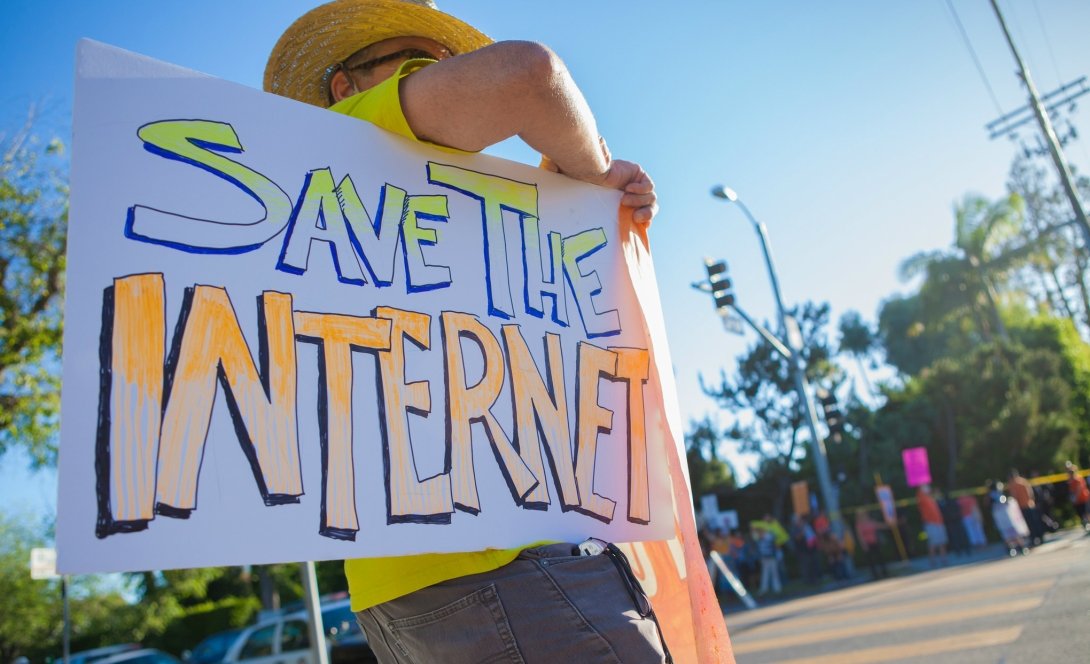Free Press and Allies Defend FCC's Net Neutrality Rules in Court

Stacie Isabella Turk/Ribbonhead
WASHINGTON — On Wednesday, Free Press filed a brief, along with several allied organizations, as proposed intervenors defending the Federal Communications Commission’s 2024 Safeguarding and Securing the Open Internet Order. Joining Free Press on the brief were the Benton Institute for Broadband and Society, the National Association of Regulatory Utility Commissioners, New America’s Open Technology Institute and Public Knowledge.
Industry groups representing companies like AT&T, Comcast and Verizon are suing to repeal the Net Neutrality rules the FCC restored in April and to overturn the agency’s decision to reinstate its Title II authority over broadband-internet access. Title II empowers the FCC to hold powerful telecommunications companies accountable for providing service on just, reasonable and nondiscriminatory terms to internet users across the United States.
“Without the FCC’s modest rules, ISPs might interfere with or discriminate against certain types of internet traffic and customers, with the FCC powerless to respond,” reads the brief. “An ISP could, for example, slow down or even block websites conveying content the ISP disfavors for political or other reasons (e.g., Fox News or MSNBC, the CDC or anti-vax sites) or to suppress competition with its own edge services (e.g., slowing or blocking Netflix or Disney Plus). These concerns are well-founded. The FCC has found for decades that broadband providers have the incentive and capability to interfere with their customers’ access to the internet.”
The brief also notes that while regulated industries routinely complain about the safeguards agencies adopt, companies’ unfounded complaints alone do not make the regulation unusual or unlawful. In fact, when it comes to understanding the authority in play, “[t]he FCC’s interpretation represents the best view of the statute and facts” — as Supreme Court justices and other appellate-court judges have routinely recognized.
In August, the 6th Circuit granted the industry groups’ request to stay implementation of the Net Neutrality rules. The court will evaluate the ISPs’ and FCC’s arguments in full when it reviews the case on the merits. Oral arguments for the case will be presented on Oct. 31.
Free Press Policy Counsel Yanni Chen said:
“It’s been nearly 20 years since Net Neutrality first came under threat. But the central question remains the same: Does the FCC have the authority, vested in Title II of the Communications Act, to step in if internet service providers treat their customers unjustly, including ISPs blocking or interfering with the free flow of information online? As our brief shows, the answer is yes.
“The FCC’s April decision restored important nondiscrimination protections and legal frameworks that the Trump administration had abandoned. The agency’s decision will allow the FCC to work toward ensuring that everyone in the United States — no matter their location, race or income — has affordable, reliable and safe internet connections free from discrimination or other ISP manipulation. We believe that the litigation to follow will debunk the unfounded industry arguments about Title II’s supposed harms to phone-and-cable giants, and about the Commission’s authority to classify broadband providers properly under the statute.
“Industry lobbyists argue, without proof, that the Trump-era repeal somehow spurred broadband deployment and speed increases while the rules’ presence allegedly impairs such upgrades. This is nonsense, as Free Press has shown time and time again by examining the companies’ own financial statements and investor briefings. Drawing on this research, our brief corrects the industry’s cherry-picked and inaccurate representations of history.
“Industry petitioners also claim that this classification is a major question that the FCC cannot decide. Our filing explains in painstaking detail how the ISPs are wrong about the history of FCC regulation in this area, and wrong about the major-questions doctrine in every respect.
“Title II is about so many rights and protections beyond Net Neutrality. People understand why we need a federal watchdog to protect everyone’s access to the most essential communications platform of our time. The FCC must be able to protect internet users from ISPs’ privacy invasions, promote broadband competition and deployment, preserve reliable access in times of public-safety emergencies, and take action against hidden junk fees, data caps and billing rip-offs.
“We’re confident in our case, even in light of recent Supreme Court decisions aimed at weakening federal agencies’ oversight. That’s because Congress intended to give the FCC the authority to make classification decisions like the one at issue here, and this FCC followed the law and classified broadband as a telecommunications service. We’ve beaten back the ISPs’ flimsy claims in court before and this brief does so again.”